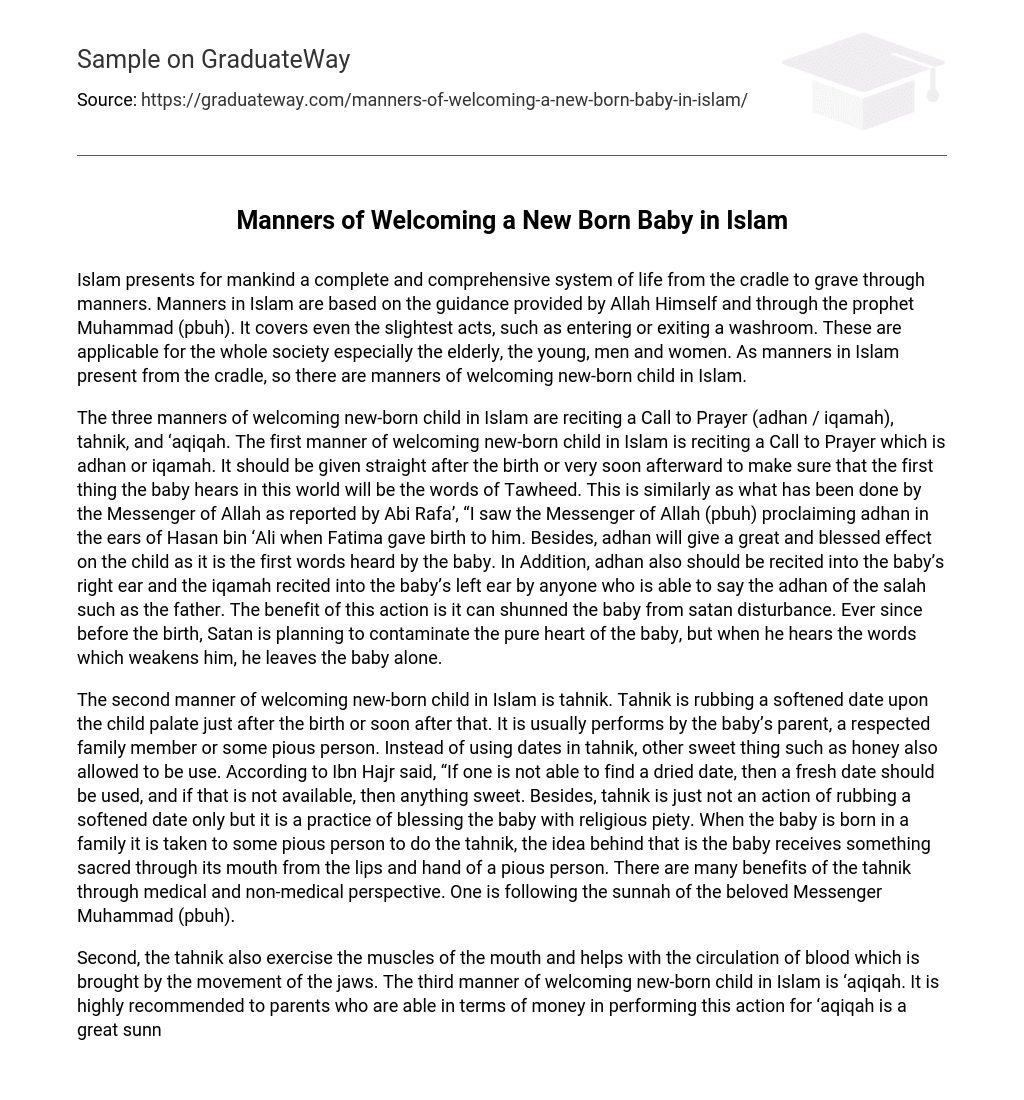Islam offers humanity a comprehensive and all-encompassing way of life, including manners from birth to death. These manners are derived from the teachings of Allah and the prophet Muhammad (pbuh). They apply to all individuals, regardless of age or gender, and even extend to seemingly minor actions like entering or exiting a bathroom. Therefore, there are specific manners in Islam for welcoming a newborn child.
Islam has three ways of welcoming a new-born child: reciting a Call to Prayer (adhan / iqamah), tahnik, and ‘aqiqah. The first way, reciting a Call to Prayer, should be done right after or soon after birth. This ensures that the first thing the baby hears is the words of Tawheed. This practice was also followed by the Messenger of Allah, who proclaimed the adhan in the ears of Hasan bin ‘Ali when Fatima gave birth to him. Reciting the adhan has a great and blessed effect on the child as it is their first words heard. Additionally, the adhan should be recited in the baby’s right ear and the iqamah in the left ear by someone who can say the adhan of salah, such as the father. This action protects the baby from disturbance by Satan, who plans to contaminate their pure heart even before birth. However, when Satan hears these words that weaken him, he leaves the baby alone.
One way to welcome a newborn child in Islam is through tahnik. Tahnik involves rubbing a softened date on the child’s palate shortly after birth. Typically, this is done by the baby’s parents, a respected family member, or a pious individual. While dates are commonly used for tahnik, other sweet substances such as honey are also permissible. Ibn Hajr stated that if dried dates are not available, fresh dates should be used, and if those are not available, any sweet substance may be used. Tahnik is not simply the act of rubbing a softened date; it is also a practice to bless the baby with religious piety. When a baby is born into a family, they are taken to a pious person for tahnik. The intention behind this is for the baby to receive something sacred through their mouth from the lips and hand of a pious individual. Tahnik has numerous benefits from both medical and non-medical perspectives, and it also follows the Sunnah of the beloved Messenger Muhammad (pbuh).
The tahnik also exercises the muscles of the mouth and aids in blood circulation by moving the jaws. Another way to welcome a new-born child in Islam is through ‘aqiqah, which is highly recommended for financially capable parents. ‘Aqiqah is a significant sunnah of the prophet Muhammad (pbuh) and fulfilling it brings rewards and merits from Allah (The Almighty). It involves sacrificing an animal to celebrate the birth of a baby girl or boy.
It is recommended to perform the ‘aqiqah ritual on the seventh day after a child’s birth, although it can be done later if needed. An example of this is when Ibn ‘Abbas narrated that the Prophet (pbuh) sacrificed a ram on the seventh day for his grandsons, al-Hasan and al-Husain. Various animals, including sheep and cows, are acceptable for ‘aqiqah. When sacrificing for a boy, two sheep are used, while for a girl, only one sheep is used. However, there is a distinction in how cows and sheep are sacrificed; cows are divided into seven parts whereas sheep are not. The meat from the sacrifice can be distributed either cooked or raw.
Moreover, it is suggested that instead of arranging a meal for the ‘aqiqah ceremony, it is preferable to prepare the meat in sweet dishes and distribute it to others. Furthermore, it is highly recommended to offer the cooked meat to individuals who are less fortunate. In conclusion, these three methods of embracing a new baby are strongly encouraged practices in Islam. Parents should ensure that they fulfill these actions for their children. Lastly, I firmly believe that Muslims should not overlook or ignore these virtuous behaviors as they can contribute to a more fulfilling life both spiritually and materially.
REFERENCES
Fairul (2011) discusses the concept of aqiqah in his blog post, which can be found at http://what-is-aqiqah.blogspot.com/. The importance of manners when welcoming a newborn child is explored in an article retrieved from http://islam-truth.co.uk/islamicstore/newborn/. The blog “Parenting in the light of Quran and Sunnah” offers guidance on parenting based on religious teachings and can be accessed at http://raabta-parenting.blogspot.com/. A book titled “Muslim etiquettes: Etiquettes regarding birth ceremony” by Shad, A. R. (1985) is also mentioned. This book is published in Pakistan by Kazi Publications. Additionally, Zahazan Mohamed’s scholarly work on adab and methods to celebrate the birth of a baby in Islam can be found on Berita Harian Online.





